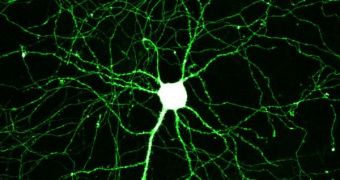When a new brain develops, there are two key processes that determine its final architecture – proliferation and differentiation. The former refers to the actual number of cells that provides the basis for neural growth, while the latter refers to the function these materials take, in becoming a certain type of nerve cell. In a new study, experts from the University of North Carolina (UNC) School of Medicine have determined that the two processes are kept in balance by a single gene, known as GSK-3.
If proliferation and differentiation are not in balance, then the brain doesn't develop normally. A higher level of proliferation could mean the appearance of tumors, as neural growth processes spiral out of control. Conversely, too much differentiation, without insufficient numbers, means that the brain will never achieve its billion-neuron architecture, which enabled us to take over the world. The UNC team has discovered that this crucial balance in the normal brain is kept by the GSK-3 gene, which, in essence, dictates how neural stem cells will populate the brain.
“It was really quite striking. Without GSK-3, these neural stem cells just keep dividing and dividing and dividing. The entire developing brain fills up with these neural stem cells that never turn into mature neurons,” the Director of the UNC Neuroscience Center, William D. Snider, M.D, explains. He is also the lead author of the new research, and a professor of neurology and cell and molecular physiology at the university. A paper detailing the finds appeared online, in the October 4 issue of the respected scientific journal Nature Neuroscience.
The new finds also bear considerable implications for a number of treatments against mental disorders, which partially rely on inhibiting the action of GSK-3. Such is the case with schizophrenia, a disease that uses the gene as an intermediary in exerting its effects on neurons. The bipolar disorder in children is also treated with lithium, a chemical that inhibits GSK-3. “I don't believe anyone would have imagined that deleting GSK-3 would have such dramatic effects on neural stem cells. People will have to think carefully about whether giving a drug like lithium to children could have negative effects on the underlying structure of the nervous system,” Snider adds.

 14 DAY TRIAL //
14 DAY TRIAL //